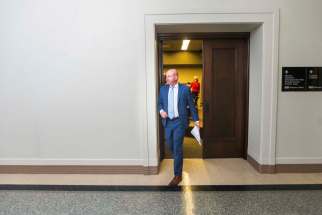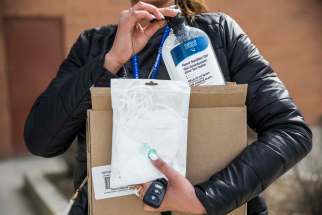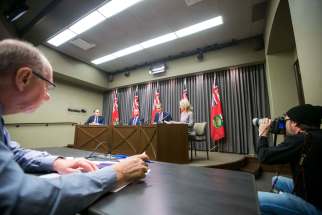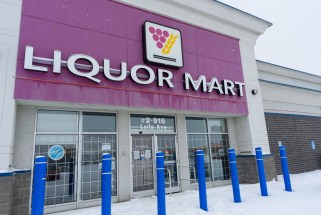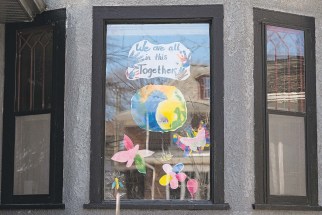Valour in our time Pandemic pushes the reset button on society's values
Read this article for free:
or
Already have an account? Log in here »
To continue reading, please subscribe:
Monthly Digital Subscription
$0 for the first 4 weeks*
- Enjoy unlimited reading on winnipegfreepress.com
- Read the E-Edition, our digital replica newspaper
- Access News Break, our award-winning app
- Play interactive puzzles
*No charge for 4 weeks then price increases to the regular rate of $19.00 plus GST every four weeks. Offer available to new and qualified returning subscribers only. Cancel any time.
Monthly Digital Subscription
$4.75/week*
- Enjoy unlimited reading on winnipegfreepress.com
- Read the E-Edition, our digital replica newspaper
- Access News Break, our award-winning app
- Play interactive puzzles
*Billed as $19 plus GST every four weeks. Cancel any time.
To continue reading, please subscribe:
Add Free Press access to your Brandon Sun subscription for only an additional
$1 for the first 4 weeks*
*Your next subscription payment will increase by $1.00 and you will be charged $16.99 plus GST for four weeks. After four weeks, your payment will increase to $23.99 plus GST every four weeks.
Read unlimited articles for free today:
or
Already have an account? Log in here »
Hey there, time traveller!
This article was published 02/04/2020 (2080 days ago), so information in it may no longer be current.
Way back on March 26 — which feels like distant history in this strange time of pandemic but was, in fact, only last week — a New York doctor gave an anonymous interview to Buzzfeed, describing how his hospital had become overwhelmed by COVID-19 patients in a matter of days.
The account was vivid, exacting, chilling. It was as if the hospital itself had become infected, the doctor said, as if the virus had taken over; multiple units were now “all intubated COVID patients.” At the end of the interview, the reporter asked what the doctor wished people knew about the front-line fight against the disease.
The doctor pointed to the images of health-care workers marching into hospitals. The ones the public looks at and dubs heroes. And he offered what may still be the most heart-wrenching quote I’ve read, since this all started — raw, vulnerable and totally unvarnished.
“In reality, I don’t want to be a hero. I don’t want to be brave. I didn’t sign up for any of this. I feel extremely vulnerable and kind of trapped. If I don’t do this, I’ll lose my job, and if I do it, I could die. And it’s not a heroic feeling. It feels like being thrown into the fire.”–Anonymous New York doctor in an interview with Buzzfeed
“In reality, I don’t want to be a hero,” he said. “I don’t want to be brave. I didn’t sign up for any of this. I feel extremely vulnerable and kind of trapped. If I don’t do this, I’ll lose my job, and if I do it, I could die. And it’s not a heroic feeling. It feels like being thrown into the fire.”
True heroism never feels that way to the people called to perform it. That’s what makes it so striking. It is never found in those who set out for greatness, only in those who, finding themselves at the heart of a crisis, hold their place in the chain, trying not to break, doing the thing they know needs to be done.
And in times of crisis, the public aches for heroes, for a saviour, for someone to come along who has all the answers. This is a double-edged sword. It makes easy prey for hucksters and grifters, or just for the reckless who tout miracle treatments that haven’t been proven. But it also puts a new spotlight on what truly matters.
In the early days of the Canadian pandemic response, Sunnybrook Research Institute in Toronto announced that a team of scientists had isolated and grown copies of the novel coronavirus. They were not the first in the world to do this, but their efforts do guarantee a domestic supply of the virus for critical research.
Researchers from @Sunnybrook, @UofT and @McMasterU have isolated SARS-CoV-2, the virus that causes #COVID19.
The isolated virus will help researchers across the world develop better diagnostic testing, treatments and vaccines: https://t.co/sK8OCpQ2NM
— Andy Smith (@DoctorAndySmith) March 12, 2020
What was even more remarkable about this announcement was the reaction. A brief post about the breakthrough on Sunnybrook’s website received massive social media traction, earning tens of thousands of retweets and a torrential flood of comments. People cheered in celebration. They said it made them proud to be Canadian.
Many of those cheering the news, by their own admission, didn’t really understand it, but it sounded good at a time when everything was spinning off-kilter and good news was desperately needed. In a matter of just days, the world had become a place where science is celebrated like a Super Bowl touchdown.
The thing is, science has always been a reliable source of heroes. It is thanks to science that we have not faced a pandemic of this scale in generations. But with each day that passes, our society is further stripped to its skeleton. We can see more clearly now what work is essential to our core survival and what isn’t.
None of this is new. The work today’s heroes do isn’t more important now than it was before the pandemic. It’s just that it took everything else going away for it to be fully appreciated. It was easy to ignore the heroes when we had places to go and things to do. It’s harder now that we are forced to stop and watch the work of others unfold.
That starts, yes, in the health-care system. It starts with the nurses, the doctors, the respiratory therapists. But also with the janitors, the kitchen staff, the people who order supplies. Across the world, these heroes march into battle without sufficient equipment: they struggle to keep enough protective clothing or N95 masks.
Not all of them will emerge from this crisis. In Italy, as many as 20 per cent of health-care workers who worked with COVID-19 patients have become infected, accounting for nearly 10 per cent of the country’s total cases. Dozens of them have died, and many more will lose their lives before the virus retreats from the world.
Now they are being honoured, at least by a frightened and grateful public. From Barcelona to Vancouver, people pause in the evenings to cheer from their homes in tribute to health-care workers. We should expand the list of people we are applauding, because the heroes of this pandemic spread out far beyond the hospitals.
Look in grocery stores, where workers race to keep shelves stocked and move customers through safely. They are vulnerable at work, stuck as they are in constant proximity to the public. Yet they keep going to work, because they have to, because the job needs to be done. If they didn’t, our basic food access would fall apart.
The list of heroes goes on. Truckers. Warehouse workers. People who work in factories all over the world, making toilet paper or canned goods or ventilators. The workers who keep garbage trucks going, who keep running water flowing. The people who ensure the bare bones of this now-skeletal society remain strong.
In Winnipeg, staff and volunteers at many non-profit organizations, working on the front lines of need and on shoestring budgets, find ways to keep offering services to our most vulnerable neighbours. Bear Clan Patrol distributes food. The West Central Women’s Centre offers hygiene supplies and take-away dinners. There are so many more.
These are the heroes we have now. They may not feel like it. The work some of them do has never been valued, or respected, or given even the most basic of benefits. When the pandemic hit, some large retailers, including Amazon, had to race to come up with paid sick-leave programs for workers who previously had little or none at all.
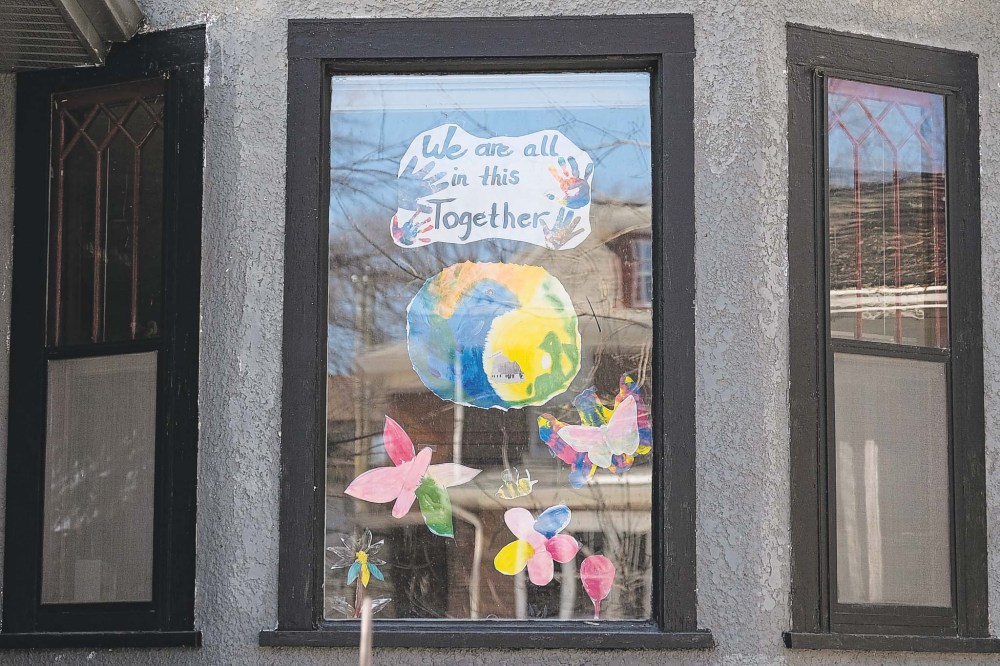
Will we remember this, when this pandemic passes? Just weeks ago, “bagging groceries” was a common punchline to an insult about one’s occupation or education, right up there with working at fast-food places. Now, it’s the grocery clerks and restaurant workers who are keeping the rest of us fed as we huddle in our homes.
Let that be a lasting image. In the New York Times, an entrepreneur calls it a “white-collar quarantine.” Celebrities post Instagram videos urging people to stay home, from the comfort of the manicured garden of their mansions. In New York, the wealthy, against guidelines, flee with their nannies to comfortable retreats in the Hamptons.
These are people with more power, and more influence, than most of us will ever know. But they are not the heroes of this story. When the world screeched to a halt, they found themselves in the same boat as most of the rest of us with nothing to do and little way to help but to wash our hands, donate where we can and stay inside.
To see where the real heroes are, look to the people who cannot stay home.
melissa.martin@freepress.mb.ca
Our newsroom depends on a growing audience of readers to power our journalism. If you are not a paid reader, please consider becoming a subscriber.
Our newsroom depends on its audience of readers to power our journalism. Thank you for your support.



